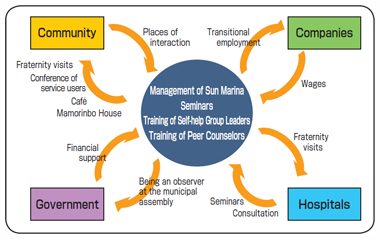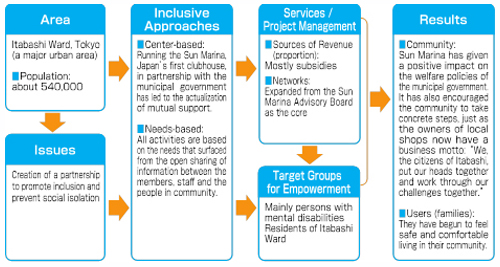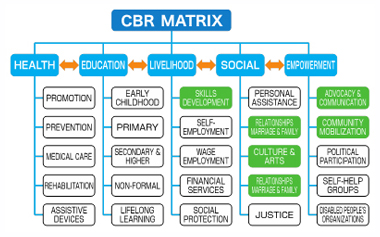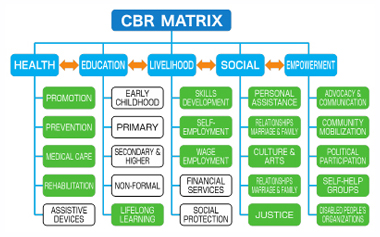Community-Based Inclusive Development
CBID Good Practices
JHC Itabashi-kai (Clubhouse Sun Marina) (Social Welfare Corporation)
(Itabashi Ward, Tokyo)
Key Words Self-help, Guidelines (International Standards for Clubhouse Programs), Information Sharing, Partnership
It has been 30 years since Joint House Cosmos (JHC) Itabashi-kai began in Itabashi Ward, Tokyo. With the slogan, “Never be alone and never leave anyone alone,” Itabashi-kai, a social welfare corporation, runs Clubhouse Sun Marina that complies with the International Standards for Clubhouse Programs. As the name suggests, JHC provides a place (House) for all people to interact and join (Joint) in harmony (Cosmos) in the old residential district of Tokyo, a mega city.
◆Background
JHC Itabashi-kai is a private support organization established in 1983 with the purpose of supporting social participation endeavors of persons with mental disabilities, conducting pioneering and creative welfare activities, and contributing to the mental and physical health and welfare of all Itabashi residents. The main thrust of our activities is on the establishment of an inclusive community for persons with mental disabilities. Sun Marina, which is at the center of these activities, was established as the first Clubhouse in Japan in 1992. The Clubhouse follows clear international guidelines, defining the Clubhouse Model of Rehabilitation.
◆Service Outline
In the field of mental health, we provide employment/transitional employment with support for vocational/skills training. We also conduct various educational activities to improve the mental health of people in the community by collaborating with mental health experts. In addition, mutual support and advocacy by persons with disabilities are organized towards the goal of a fulfilling life. To further promote self-help and employment, we provide home-based welfare services for citizens as well.
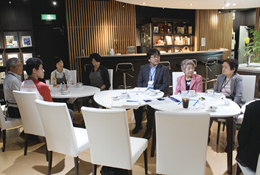
One of our projects: Smile Café
Basic Data
●Coverage Area: Itabashi Ward, Tokyo (a major urban area)
●Population: about 540,000 (Aging population is relatively advanced in Tokyo. 22% of residents are 65 years and older as of December 2014.)
●Issues: No job opportunities for persons with mental disabilities; discrimination, prejudice and negative perception against them.
■Year of Establishment
JHC Itabashi-kai was established as a private support organization in 1983. It opened Sun Marina in 1992.
■Contents of Services
●Objectives: Creating a friendly community; organizing activities jointly with the people in the community to promote mental health and welfare
●Purpose of Services and Target Groups: Because inclusion for persons with mental disabilities is the aim, our target clientele are persons with mental disabilities and all the residents in the community.
●Stakeholders: Clubhouse members, service users, community residents, Itabashi Municipal Government, companies who have hired former clients, Advisory Board members, our office staff, Shopping District Promotion Association Officials, and seminar audience
●Main Source of Revenue: Sales from services; remuneration given for services based on the national welfare system. In close collaboration with the municipal government, Clubhouse Sun Marina is allotted a sufficient budget as it is considered as Itabashi’s own unique project.
●What We Have Implemented: The history of JHC Itabashi-kai’s services can be traced back into 3 different periods:
First stage (1983 and 10 years after): During this early period, supported employment, peer counseling, and workshop activities were provided so that the members could engage in self-help activities and prepare for employment, while interacting and contributing to the community.
Second stage (1992 and 5 years after): We focused on establishing the mutual support system, which included peer support, transitional employment services and fraternity visits. It was at this time when the training of self-help group leaders began.
Third stage (1997 up until today): Focus is on encouraging participation and collaboration for the extension of a multi-disciplinary and multi-functional network and an integrated community support system based on the law. Specific services are listed as follows:
- Support for Continued Employment Type B (cleaning services, housekeeping assistance, running of an old-fashioned penny candy store)
- Transitional Employment Support Program (vocational training, work outside of welfare/employment support facilities, job support)
- Designated consultation support office / Community Activity Support Center Type I
- Peer support network center
- Clubhouse
- Group homes
- Employment and life support center
- Community interaction center, management of Peer Café
■Special Festures
■Comprehensive Information Exchange
At Clubhouse Sun Marina, meetings are held three (3) times a day – at the day’s beginning; after lunch; and after the day’s activities in the evening. Daily activities are decided upon by everyone in a discussion.
Any requests for services from outside are decided upon as to whether they should be accepted or declined, as well as who should be assigned to the matter. Even the things that could be handled by certified specialists are also discussed and decided on during any of the 3 meetings of the day. The slogan of the Convention on the Rights of Persons with Disabilities, “Nothing about Us without Us,” is practiced here every day.
What is actually practiced here in each of our three meetings every day is: Consult, consult, and consult.
■International Standards for Clubhouse Programs
JHC Itabashi-kai has made every effort to observe the International Standards for Clubhouse Programs consisting of 36 articles. In the daily meetings, members read out the standard and practice them in JHI activities.
The concept of transitional employment, for instance, is expressed in Article 22 of the International Standards for Clubhouse Programs – “The desire to work is the single most important factor determining placement opportunity.” Since the Clubhouse Model was regarded as a project of the Itabashi government, a sense of equal partnership has been achieved between us service providers and the government in the planning, decision-making, and running of this clubhouse.
■Advisory Board and Conference of Service Users
In JHC Itabashi-kai, there are seven (7) Advisory Board members. They are different from the typical executive board members of a corporation in the sense that they are collaborators of community projects. There is also a conference of service users that is held once a year to share achievements with supporters, community residents and government staff. This conference is where peer support takes place as well. The Advisory Board and the conference of service users offer opportunities for people to understand our activities and join us. We provide such opportunities in the hope that everyone will support the community. JHC Itabashi-kai runs the Smile Café, as pictured, and it was donated by one of the Advisory Board members. This offer was made not because he happened to be an Advisory Board member who was expected to give support, but because he saw the need to help stimulate the shopping district with a community model project. Both the Advisory Board and the conference of service users held every year have contributed greatly to community participation.
■Fraternal visits:
Fraternal visit is one of the ways to promote mutual support. This includes visiting sick members at home or in hospital, and writing letters of encouragement. Outreach activities are carried out by and for the people involved in JHC Itabashi-kai to prevent anyone at home and in hospitals from becoming isolated from the community and to give them a sense that they are still members of the community.
■Operation of the Clubhouses
Clubhouse Sun Marina basically conducts self-help group activities, which include running the Clubhouse itself, and mutually interactive activities involving leisure, education, employment and housing. The Clubhouse members closely interact with overseas members through the World Conference of Clubhouses as well.
Our target group, being those with mental disabilities residing in Itabashi Ward, are called “members” at the Clubhouse. Through transitional employment, members receive practical job training at private companies to help them build self-confidence in working for a company. As part of pre-assignment training, the members themselves help operate the Clubhouse using computers and cooking meals. This is done to provide the members with opportunities to interact with others to release their stress caused by isolation. Fraternaty visit activities like assisting members when shopping and going to hospitals helps people interact with others outside the Clubhouse. For educational/training activities, we have held a Peer Workers’ Training conducted by visiting lecturers, conducted mental health seminars given by psychiatrists, and offered word processor/computer courses. In the consultation process, members’ problems are dealt with, not only by the staff and specialists, but also by the members themselves through peer counseling.
The services of Sun Marina are carried out according to the World Clubhouse Standard Model:
1) Educational support (e.g. seminars on advocacy)
2) Employment support (provision of transitional support for nine (9) to twelve (12) months for on-the-job training at private companies, sometimes with the staff accompanying the members as job couch; 27 former members out of 52 have started working in regular companies so far)
3) Social interaction (watching plays and conducting social events)
4) Operation of Clubhouse (Clerical work is assigned to the members like receiving visitors/telephone calls, accounting, and documentation.)
◆How Things Changed
●Working on Individuals
Since the establishment of JHC Itabashi-kai 30 years ago, Chairperson of the Board, Ms. Takako Teratani, has always emphasized, “To give due respect to the users’ self-determination, we need to have their perspective as they live in the community.” This concept has led to a partnership with the local government, and it has been understood and accepted by all the stakeholders, such as the Clubhouse members, service users, and the community residents, and it has been put into practice well. We know that this policy is effective for the members, as they have been using and enjoying the comfort of our services for some time now.
Having the Sun Marina as the first Clubhouse in Japan observing international standards, its guidelines have provided a positive impact for all concerned. This has engaged the members more actively in employment-related activities and they have become more positive in doing daily tasks.
Information exchanges between the members and staff has been effective in building trust, and those who have seen it work join forces in fostering more trust. Such information exchanges have mutually beneficial effects when it comes to letting members take the initiative to organize activities, collaborate with others for various services and involve more people.
●Working with Communities
Itabashi area, where Itabashi-kai is located, is known as a post-station town for the old Nakasendo road, just like Shinagawa is for the Tokaido road, and has always been known for welcoming people from the outside. Like any other old residential district of Tokyo, there is a shopping district next to the railway station where people come and go. Some unique approaches have utilized its local characteristics, leading to the creation, for instance, of the Café of Nakao Kogyo Co., Ltd. and the Mamorinbo House of the Kamiita Minamiguchi Ginza Shopping Street; and so there are an increasing number of opportunities for transitional employment in the community. A heightened awareness of such people in the community is apparent, as they are more cooperative in helping with our charity bazaar, and shop owners in the shopping district show an increased interest in our activities. Overall awareness and understanding has been definitely enhanced. The Mayor of Itabashi Ward talks of the need for more collaboration with residents in executing the policies of the local administration. The long-standing relationship between the government and the JHC Itabashi-kai has positively impacted the community through this new type of public-private partnership.
■Current lssues and Way Forward
1. Since we have a partnership with the municipal government and the Clubhouse is regarded as Itabashi Government’s project, we depend on the government’s annual budget allocation, which involves some risks.
2. As regards community support enhancement, we would also like to sensitize elementary and junior high school students as part of welfare education.
■Analysis Using the CBR Matrix
◆When the Oyama Workshop began (1984)
When JHC Itabashi-kai officially began, its initial focus was on promoting mutual interaction and contributing to the community, which falls under Society and Empowerment in the matrix. It is noteworthy that Itabashi-kai has made several approaches to mobilize the community from the very beginning.
◆After setting up Sun Marina (1992)
Its range of activities has increased to cover mutually supportive systems and networks of participation and collaboration. While engaging in Livelihood and Health activities, Society and Empowerment have shown improvement, too. On the whole a wide range of activities are covered. However, the CBR Matrix shows that Education remains an issue and a task for the future.

